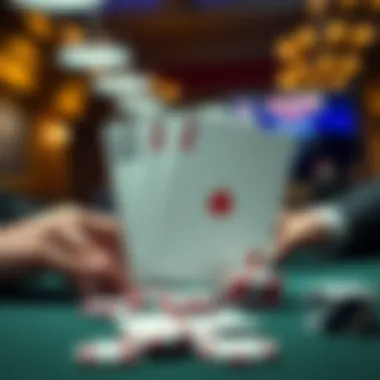Mastering Blackjack Card Counting Techniques and Strategies


Intro
Blackjack is not just a game of luck; it's a battle of wits where strategy plays a pivotal role. One undisputed method to tilt the odds in your favor is through card counting. This method enables players to keep track of the ratio of high to low cards remaining in the deck, optimizing their chances of winning. The elegance of blackjack card counting is in its simplicity, yet it requires discipline, practice, and a solid grasp of several techniques.
This article will guide you through the essential components of mastering blackjack card counting. We will discuss the various betting strategies that help you maximize your earnings while minimizing losses. By understanding how to manage your bets effectively, you'll be better equipped to navigate the casino's unpredictable tides.
Additionally, you'll find insight into the counting systems that have stood the test of time, as well as some psychological aspects that should not be overlooked in this game of chance. Each section is designed to build your confidence, whether you're just starting or looking to refine your skills. So, grab your cards, and let's dive into the world of card counting!
Intro to Blackjack Card Counting
Mastering the subtle art of blackjack card counting can feel like diving into an expansive ocean of strategy and skill. It’s not just about the cards you hold but the entire dynamic of the game—your awareness of probabilities, decisions, and the moves of your fellow players. This section serves as a foundational pillar for understanding card counting's significance in the realm of blackjack. Here, we’ll explore the essentials and why honing this skill can lead to a transformative gaming experience.
Understanding the Basics
At its core, card counting is a strategy employed by players to keep tabs on the ratio of high to low cards remaining in the deck, giving you an edge when determining whether to increase your bets. The practice isn't as complex as it might sound. It's essentially a method of tracking cards that helps players gauge when the odds swing in their favor. Those who grasp the basics can walk into a casino with a confident stride, knowing they have an informed approach rather than just relying on luck.
To start, familiarize yourself with the values assigned to cards:
- High cards (10s, face cards, Aces): +1
- Low cards (2 through 6): -1
- Neutral (7, 8, 9): 0
This straightforward system lends itself to a clearer prediction of the deck’s state, but to deepen your understanding, consider this: each high card dealt increases your chances of busting your opponent, while a surplus of low cards could indicate a safer environment for your hands.
The Importance of Card Counting
The significance of card counting beckons every serious gambler to pay attention. It goes beyond just adding to your intuition; it’s about making calculated decisions that can minimize losses and maximize returns. Knowing when the deck is favorable means you can raise your stakes when the odds are stacked in your favor—this can be likened to a general understanding the terrain before entering battle. If the generals have a read on the battlefield, they can place their troops wisely.
Moreover, card counting encourages a disciplined approach to gaming. Players must concentrate, develop focused habits, and refine their strategies over time. As such, the mental exercise strengthens cognitive skills that can bleed into other domains. Card counting, therefore, not only elevates your blackjack game but also sharpens your capacity for critical thinking and math.
In summary, entering the world of blackjack card counting is not just about improving your odds; it's a commitment to understanding the intricate dance of chance, skill, and human behavior at the table. By mastering these techniques, you bolster your chances of turning the tables in your favor.
"Understanding card counting is akin to peering behind the curtain of the casino—enabling players to shift the odds towards themselves, one calculated move at a time."
In the sections that follow, we delve deeper into specific strategies and techniques that enhance your skills in this intriguing game. More than just numbers, it’s about cultivating a balanced mindset and integrating practice into your strategy.
Core Card Counting Strategies
When it comes to card counting in blackjack, understanding the core strategies can be the cornerstone of elevating one's game. Utilizing effective counting systems enables players to track the ratio of high cards to low cards left in the deck. This knowledge is power in the casino world, as it allows players to make informed betting choices, thus maximizing profit while minimizing risk.
Hi-Lo Counting System
The Hi-Lo system is perhaps the most popular card counting method out there. In its essence, this system assigns a simple numerical value to the cards:
- Cards 2 to 6 are counted as +1,
- Cards 7 to 9 have a value of 0,
- Cards 10, Jack, Queen, King, and Ace are counted as -1.
As the game progresses, players keep a running count by adding or subtracting these values as cards are dealt. When the count is positive, it suggests a larger proportion of high cards remain in the deck. This signals upward adjustments in bets, as higher cards favor the player more than the dealer.
While the Hi-Lo system is effective, players should remain vigilant and keep in mind that distractions abound in a casino. It’s not solely about knowing the numbers; it’s about being able to focus and accurately compute on the fly amidst the hustle and bustle.
Omega System
For those seeking a more complex approach, the Omega II system offers flexibility and depth. This method assigns values as follows:
- 2, 3, and 7 count as +1,
- 4, 5, and 6 are valued at +2,
- 8 and 9 are 0,
- 10, face cards, and Aces count as -2.
The complexity of this system means it can provide more accurate insights into the favorability of the deck. Players using Omega II can analyze game situations that others may overlook. However, the learning curve can be steep, requiring diligent practice and focus. The extra granularity allows for different betting strategies based on the situation, making it a tool for players aiming for higher precision.
KO System
The KO system, or Knock-Out system, stands out due to its simplicity and effectiveness. Unlike other counting systems, it doesn't require adjustment of the count for the number of decks in play, making it more accessible.


In the KO system, the values are:
- 2 through 7 count as +1,
- 8 and 9 are 0,
- 10 through Ace are counted as -1.
Players keep a running count without needing to divide by the number of decks, thus streamlining the process. This method proves particularly advantageous for novice players, allowing them to get their feet wet in the world of card counting without feeling overwhelmed. While it offers simplicity, like any system, mastery comes with time, patience, and practice.
Mastering these core strategies is vital in the world of blackjack card counting and can have a profound impact on your gaming success.
In sum, choosing the right strategy often hinges on a player’s comfort level and skill set. Whether it’s the Hi-Lo for its popularity, the Omega II for those who crave complexity, or the KO for ease of use, knowledge of these methods can open doors to improved casino experiences.
Practice Techniques for Improvement
Improving card counting skills isn't just about learning a technique; it’s about refining one's abilities through practice and situational awareness. For those eager to master blackjack, the importance of diligent practice techniques cannot be underestimated. These techniques serve multiple purposes, including reinforcing memory, building confidence, and enhancing the ability to adapt to live casino environments. When players consistently drill their skills, they pave the way for more successful and informed plays at the blackjack table.
Solo Drills for Card Counting
Solo drills are a fantastic approach for anyone looking to delve deep into the world of card counting. The beauty of solo practice lies in its flexibility, allowing one to train at their own pace without external distractions. Here's how to effectively implement solo drills:
- Flashcard Exercises: Create flashcards with different card values and distribute them randomly. As you flip each card, practice the appropriate counting strategy. The quicker your reflexes, the better your count will be under pressure.
- Counting Decks: Use a standard deck of cards and practice counting through them, keeping track of your running count. Emphasize speed while maintaining accuracy. A typical drill could involve running through one deck and jotted down the time it takes.
- Simulating Casino Conditions: Lay out several decks of cards in front of you, shuffle them well, and count cards as if in a live game. This not only practices counting but also prepares your mind for the pressures of real gameplay.
Using Software Simulations
In today’s tech-savvy age, software simulations offer a unique avenue to practice card counting. Several applications and programs are designed specifically for this purpose. Key benefits include:
- Automated Feedback: Many simulations provide instant feedback on your counting accuracy, allowing you to adjust your methods on the fly.
- Realistic Scenarios: Software can mimic various game styles and dealer behaviors, exposing you to different situations that you might encounter.
- Progress Tracking: It enables users to monitor improvement over time, setting benchmarks for future sessions.
To get started, consider downloading apps like Blackjack Card Counting Trainer or using online platforms that provide interactive training. These can be a goldmine for honing skills without the financial risk associated with in-person play.
Engaging with Practice Groups
Joining a practice group can be incredibly beneficial for personal development in card counting. Being part of a group offers a sense of community and allows for shared learning experiences. Here are a few ways to maximize your practice with peers:
- Group Drills: Collaborate with others to run drill sessions. One can randomly call out cards, while the other keeps count. This mirrors the pressure of live scenarios and enhances one’s focus.
- Knowledge Sharing: Each group member likely brings unique insights or strategies. Discussing different counting methods and play scenarios can enrich understanding.
- Mock Tournaments: Organizing mock blackjack games lets players apply their counting strategies in a controlled environment with real stakes among friends, providing an element of competition and realism.
Engaging with fellow enthusiasts not only fortifies counting skills but also adds an element of social interaction, making the learning curve less steep and a lot more enjoyable.
"Practice does not make perfect. Only perfect practice makes perfect."
Henry Ford
For more in-depth reading on the subject of card counting and the psychology behind gambling strategies, you can check out resources like Wikipedia on Card Counting or explore community discussions on Reddit's Gambling Forum.
By focusing on these practice techniques, individuals can elevate their game and approach blackjack with a well-honed skill set.
Analyzing Game Situations
Understanding the context in which you’re playing blackjack goes beyond just knowing the rules or mastering the counting systems. Analyzing game situations is pivotal for making informed betting decisions and adapting your strategy effectively. By considering specific elements such as table dynamics and player behavior, as well as variations in game formats, players can significantly enhance their edge against the house. Here’s a closer look at what makes this analysis essential.
Table Dynamics and Player Behavior
Every blackjack table has its unique vibe, influenced by the mix of players and their styles. Recognizing these dynamics can lead to insights that might not be immediately apparent.
- Player Types: Observe how fellow players behave at the table. Are they conservative, aggressive, or somewhere in between? Each player’s style can affect the betting patterns and the overall game atmosphere. If you notice a player who frequently raises bets, it may indicate a higher risk tolerance, which could affect your decisions.
- Interaction with the Dealer: In many cases, the dealer’s demeanor can change the pace of the game. A friendly dealer might encourage more interaction, while a more serious one could keep the focus strictly on the cards. Be attuned to these moods, as they can influence how players react.
- Table Position: Your position relative to the dealer matters. Being seated in a later position allows you to observe others' actions before making your move, granting you valuable information to adjust your strategy on the fly.
In summary, mindful observation of these elements not only sharpens your strategic approach but can also aid in creating a comfortable environment. The ability to read the table dynamics enhances your situational awareness, which is key in card counting and making statistically sound decisions.
Adapting to Game Variations
Blackjack is not a one-size-fits-all game. Variations can drastically change optimal strategies, including card counting approaches. Here are a few instances of how adapting to these variations proves beneficial:
- Rules Variations: Some games might allow surrender, while others restrict doubling down on certain totals. Understanding these rules is crucial as they can alter the effective strategies you employ. For example, if doubling down is allowed on any two cards, you have a legitimate reason to increase your bets when you sense a favorable count.
- Payout Differences: The standard payout for a blackjack is 3 to 2. However, some casinos offer a 6 to 5 payout on blackjack. This subtle change can greatly affect your long-term returns, and thus you should adjust your focus and tactics accordingly.
- Number of Decks Used: The number of decks in play can influence the effectiveness of your counting system. More decks usually mean more variance, so you'll need to tweak your strategy. A Hi-Lo count might work better in a single-deck game, while a more sophisticated system may be necessary for shoe games.


By taking the time to adjust your strategy based on these variations, you do more than just keep pace with the table; you actively shape your gameplay to attain a more favorable outcome.
Analyzing these situations before placing bets simplifies the path to spotting advantageous scenarios where your counting skills can truly shine.
"In blackjack, knowledge of the game varies can be as crucial as the cards you hold."
In summation, sharpening your ability to read the game situationally will empower you to capitalize on the strengths of your card counting skills, ensuring that each decision aligns with the shifting dynamics at the table.
Psychological Aspects of Card Counting
Understanding the psychological elements of card counting is crucial for anyone aspiring to become a proficient blackjack player. Its not just about the numbers; it’s about how you process information and react under pressure. Mastery in blackjack card counting requires a balance of emotional control, mental concentration, and the ability to adapt to various game situations. Ignoring these aspects can lead to costly mistakes and missed opportunities. Let’s delve into two essential components: maintaining focus during play and managing stress and emotions.
Maintaining Focus During Play
Focus is your best friend at the blackjack table. When you're counting cards, distractions can rattle even the most seasoned players. Every card that’s dealt shifts the game’s dynamics. If your mind starts to wander or you let external distractions pull you away, you're bound to mess up your count.
- Practice Mindfulness: Incorporate mindfulness techniques into your practice sessions. Before you start counting cards, take a moment to center yourself. This enhances your concentration. Focus your attention solely on the game, blocking out chatter from other players and the mechanical sounds of the casino.
- Divide Your Attention Wisely: Task-switching can scatter your focus. While it's critical to keep the card count, also watch the dealer’s actions and how fellow players are betting. This dual-layer awareness boosts your ability to make informed decisions. But, don't overload your brain with too many tasks; find a way to streamline this attention into effective monitoring.
To successfully keep your focus squared on the game, consider setting boundaries. Decide beforehand to break your concentration only during breaks or when you finish a hand. Taking control of your environment, like choosing a less crowded table or playing at specific times, can also help.
"In blackjack, losing your focus is much like trying to navigate a maze blindfolded—the path can get really frustrating, really fast."
Managing Stress and Emotions
Just as focus is vital, so is understanding how to handle the emotional roller-coaster of gambling. Winning and losing can shake you to your core. Card counting can elevate your expectations—if you’ve put in the hours to master it, the stakes can feel higher.
Here are a few strategies to keep your cool:
- Set Realistic Expectations: Remember, card counting increases your chances but does not guarantee winning. Expectations should align with your understanding of the game and its inherent risks.
- Develop a Routine: Routines before and during your game play can help ground you. Whether it’s a simple stretch or a deep breathing technique, finding what triggers calmness can enhance your overall performance.
- Self-Assess: After each session, take time to reflect on your emotional state. Were you too aggressive? Did fear of losing alter your bets? Understanding these moments allows you to learn and grow.
Managing your emotions requires ongoing work. As you gain experience, you’ll build resilience. Successful players know that a soundtrack of silent confidence goes hand-in-hand with their card counting techniques.
In summary, mastering the psychological aspects of card counting is as vital as understanding the technical strategies. By maintaining focus and managing stress effectively, you set yourself on a path to better gameplay. This doesn’t just make you a more skilled player; it forges a mental framework that empowers your blackjack journey.
Common Pitfalls and How to Avoid Them
In the realm of blackjack card counting, players often harbor a mix of excitement and trepidation. Mastering the game is no small feat; it requires diligence, strategy, and, perhaps most importantly, an awareness of common pitfalls that can derail even the most seasoned players. Awareness of these traps can enhance your gameplay and extend your lifespan at the tables.
If one isn’t cautious, it’s easy to fall into habits that undermine the effectiveness of your counting strategy. Understanding these challenges can lead to smoother play and a more rewarding experience at the blackjack table.
Errors in Basic Strategy
At the heart of blackjack lies the basic strategy, which is a fundamental blueprint for success. It touches on how to approach every possible hand based on the dealer's visible card. While most card counters focus on counting methods, ignoring the basic strategy is a common error.
Imagine you're at a table. The dealer shows a 6, and you hold a 10 and a 5. Knowing the basic strategy suggests you should hit, yet many players might overthink it and stand. This deviation can lead to squandering valuable opportunities.
Key Considerations for Avoiding Basic Strategy Errors:
- Stay Informed: Regularly review the basic strategy charts, and familiarize yourself with the recommendations for different scenarios.
- Practice with Real Cards: Get accustomed to the flow of the game without the pressure of actual stakes. This can help reinforce your understanding.
- Remain Consistent: Stick to the strategy even when emotions run high. It’s easy to get carried away in the heat of the moment, but one poor decision can ripple through your entire session.
"A sound strategy is your best friend at the blackjack table; it keeps you grounded when the stakes are high."
Overcomplicating the System
In the quest to enhance their edge, some players tend to overcomplicate their approach, concocting methods and systems that often do more harm than good. When you load your strategy with unnecessary complexities, you risk losing the very essence that makes card counting effective.
Recognizing Overcomplication:
- Straying from Simplicity: For instance, if you’re tracking too many variables or resorting to multiple counting systems simultaneously, your focus may wane.
- Be Wary of Advanced Strategies: Techniques like side counting specific cards can prove valuable, but for those new to counting, they often lead to confusion rather than clarity.


Ways to Simplify Your Approach:
- Stick to One System: Master a core counting system, like Hi-Lo, before attempting to integrate others.
- Embrace a Structured Practice Routine: Establish a learning regimen that allows gradual progression without overwhelming complexity.
In navigating the world of blackjack, avoiding these common pitfalls is pivotal. By grounding oneself in solid basic strategy and resisting the allure of unnecessary complexities, players can significantly enhance their effectiveness at the tables. Armed with this awareness, you stand on firmer ground as you journey through mastering card counting.
Ethics and Legality of Card Counting
Understanding the ethics and legality behind card counting is paramount for anyone serious about enhancing their blackjack game. While card counting is a skill that can significantly improve one’s odds at the table, it walks a fine line, often leaving players in murky waters regarding casino rules and legalities. For those looking to delve into this strategy, grasping these aspects can mean the difference between a thrilling victory and a quick ban from the casino.
Legal Considerations
At its core, card counting is merely an application of skill, a mental exercise in keeping a running tally. Most jurisdictions do not criminalize card counting as it doesn't involve deception or cheating per se. Yet, the laws can differ vastly around the world.
- Individual Rights: Gamblers have the right to employ mental strategies for advantage, as long as they don’t engage in practices that involve devices or outside assistance.
- Country Specific Laws: In some countries, like the United States, card counting is legal. However, casinos reserve the right to refuse service to anyone, which means they can ask you to leave if they suspect you're counting cards. This local variability highlights the importance of familiarizing oneself with regulations in specific jurisdictions.
"Gambling falls predominantly within the realm of individual choice, but it is essential to navigate the spatial terrain between legal play and exclusionary practices."
Casino Policies on Card Counting
Casinos have their own code of conduct regarding card counting, and it is vital for players to acknowledge these rules. Even if counting cards is a legal strategy, it is frowned upon by casinos, leading them to take various preventive measures.
- Surveillance Tactics: Most casinos utilize advanced surveillance systems to track player behavior. If they detect consistent betting changes or behaviors commonly associated with card counting, they may take action, ranging from simply watching the player more closely to outright barring them from the establishment.
- Changing Rules: Some casinos might shift their rules, such as increasing the number of decks used or implementing continuous shuffling machines to thwart counting strategies.
- Convincing Lies: Despite being a skill-based method, casinos often label card counters as cheaters in public discourse, adding a layer of social stigma to the practice.
Future Trends in Card Counting
The landscape of card counting in blackjack is constantly shifting. As technology evolves and player strategies adapt, the future of card counting becomes an intriguing subject. Understanding these future trends is essential for any gambler who aims to stay ahead of the game. It’s not just about counting cards anymore; it’s about adapting to new tools and techniques that come into play.
Technological Advances in Gaming
Technological advancements are making significant waves in the world of gaming. Mobile apps and online platforms are becoming commonplace, providing players with instant access to games, practice simulations, and even training tools. Here are some notable advancements shaping the future of card counting:
- Mobile and Web Applications: Applications designed to track card counts and suggest strategies are readily available. Players can practice card counting without needing a physical deck. This allows for a flexible training environment, whether it’s on the train, at home, or on break at work.
- Artificial Intelligence (AI): AI technology can analyze vast amounts of game data, helping players identify trends that may not be visible to the naked eye. Furthermore, some platforms utilize AI to develop personalized strategies, making card counting feel less like a solitary endeavor and more like a savvy partnership.
- Virtual Reality (VR): Imagine honing your card counting skills in a realistic, immersive environment. VR technology is on the rise, offering gamers an engaging way to practice. This brings a new layer of depth to understanding table dynamics and player interactions, making practice more relevant and effective.
"As technology continues to evolve, so too will the skill sets required by card counters. Staying aware of these advancements is essential to mastering the game."
Evolving Strategies and Systems
As the game of blackjack and the techniques surrounding card counting mature, so do the strategies employed by players. Adapting to new knowledge and heightened competition is vital. Here are ways in which strategies and systems are evolving:
- Hybrid Count Systems: Players are increasingly merging different systems to create hybrid counting methods. This dual approach offers more robustness against varying deck compositions and table styles. By combining elements from, say, the Hi-Lo and Omega II systems, a player may achieve greater precision in their counts.
- Increased Focus on Player Psychology: Understanding the psychology of other players and the dealer is becoming just as crucial as counting cards. Observant card counters are developing strategies that not only rely on numerical advantage but also on reading emotional cues and behavioral patterns.
- Collaboration and Networking: Players are forming networks or groups to share insights and techniques. This collaborative spirit enhances learning opportunities, as players can discuss strategies and pitfalls openly, and test them against real-life conditions.
Staying in tune with these trends is not just beneficial, but vital for card counters aiming to maintain an edge in both online and brick-and-mortar settings. Knowledge of advances in technology and evolving strategies is what separates the novice from the expert in the ever-competitive world of blackjack.
Finale: Elevating Your Blackjack Game
The world of blackjack card counting is not just about numbers; it's about strategy, mental acuity, and continual enhancement of gameplay skills. Understanding the nuances discussed throughout this article can really make a difference for players at any level. Whether you’re just dipping your toes into the water or you're a shark looking to dominate, elevating your game necessitates a holistic approach that blends theoretical knowledge with practical experience.
Mastering these techniques can offer several tangible benefits. For one, astute gamblers can turn the odds in their favor, transforming blackjack from a game of chance into a calculated battleground. This informs decision-making under pressure, instilling confidence when the chips are down. Players who commit to understanding card counting aren’t merely trying to win; they are on a mission to refine their craft, making tactical choices grounded in real-time data.
Remember, the journey in blackjack is continuous. Practices can always evolve, and there's always room to grow. The secret lies in being adaptable, continually assessing strategies, and staying aware of your environment. In casinos, where player behavior could change with the wind, maintaining flexibility is paramount.
"The game might be the same, but the players and strategies are forever evolving. Adapt or get left behind in the dust!"
Look back at previous sections, take the time to practice your skills, and engage with fellow players to share experiences. Each step taken in refining your card counting techniques fosters not just improvement, but an elevation of your overall approach to the game.
The Journey of Continuous Improvement
Embracing continuous improvement means that the road ahead requires commitment and perseverance. It’s crucial to view learning as an ongoing process rather than a destination. This pursuit for refinement can encompass not just the mechanics of counting cards but also the broader aspects of gameplay, strategy adaptation, and psychological resilience. Consider maintaining a log of your sessions to track what strategies yield the best results. Reflecting on past performances can provide a blueprint for future success.
Incorporating regular feedback loops is also beneficial. Engaging with groups or online forums like Reddit or specialized poker chat rooms enables players to exchange insights and perspectives. Learning from mistakes, especially in blackjack, is often the most revealing. It’s how players sharpen their edge and confront challenges effectively.
Final Thoughts on Card Counting Mastery
Reaching mastery in card counting is akin to gaining any skill worth having; it requires time, patience, and an eagerness to improve. As you navigate this landscape, remember that each hand played is an opportunity to enhance your understanding of the game mechanics, betting patterns, and the psychology of both yourself and your opponents.
As we discussed, the ethical implications of card counting are significant, and a seasoned player knows how to tread lightly within casino walls. Whether you aspire to make blackjack a casual pursuit or seek to profit from it, the strategies you're armed with will determine how well you navigate the game. Thus, it is up to you to uphold good practices and prioritize integrity while you strategize your way to blackjack mastery.







